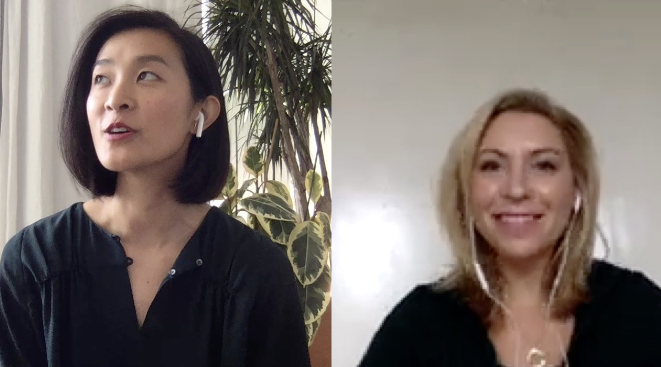A second-time founder who scaled a business to $5MM+ annual revenue and appeared on SharkTank (getting an offer from Mark Cuban, no less), Desiree shares her greatest challenges as a leader.
Every two weeks as part of The Heartbeat , I asks one question to a founder, CEO, or business owner I respect. This week, I interviewed Desiree Vargas Wrigley, Founder + CEO of Pearachute. Watch & read what she has to say here…
Desiree Vargas Wrigley is the founder + CEO of
Claire: Hi everyone. I’m Claire Lew, and I’m the CEO of Know Your Company. Today, I am honored to have someone who I admire, a good friend of mine. I have Desiree Vargas Wrigley, who is the founder and CEO of Pearachute, which is this amazing platform that helps anyone who has kids drop into any class that they want. I think it’s yet a brilliant idea and she’s really built and grown the company. Before that, was the founder and CEO of GiveForward.
Something really cool that Desiree was also telling me about was they’re actually now offering Pearachute as a great work park. So something you can actually give your parents who are parents to help them, yeah, just really engage and feel connected with their kids. So anyhow, Desiree, it is so amazing to have you here and to be able to ask you this one question about leadership.
Desiree: Thank you for having me, I’m excited to see you.
Claire: Thanks. Okay, so you don’t know the question in advance, so brace yourself. Here’s what I’d like to ask and here is what I’ve been asking CEOs and founders who I respect, which is: What’s one thing or it can be several things, you wish you would have learned earlier as a leader?
Desiree: That is a big question. Early on someone gave me this advice but I didn’t know actually how to internalize it until later. So I’m going to start with … I’m going to make it a two-part.
But the first one was that don’t beat yourself up too much when things go wrong, but also don’t take too much credit when things are going right. Because a lot of times there are things that are happening as a leader and as a company that are out of your control.
As much as you want to believe that you are driving everything, external forces really do have an impact and great hires of course make up … as terrible hires sometimes make an impact. At the end of the day, like yes, you are the one holding the bag as CEO, but it’s never all your fault or all your credit. It probably sounds obvious, but I think in the early days I really thought if I work harder or if I think smarter I’ll be able to solve this problem all the time. Sometimes there are really just outside factors and you have to learn how to navigate them and kind of remove ego from the scenario to be able to just really perform.

That’s one, and then … Two, figuring out what kind of leader I wanted to be. I think a first founder, a mistake that a lot of us have which is tied to my first part of the answer is that you are so closely identified with the business that you’re creating because it came out of your brain. It’s literally like your brain child and you are convincing people to come and work on it with you, and convincing people to invest in it. It is so closely tied to how you feel about yourself. So the ups and downs can be … You know, have a really big impact I think on your mental state but also on your quality of leadership.
The more you can remove your sense of self-worth from the performance of your business, the better your business and your leadership will be.
You’re able to see more clearly kind of where your baby is ugly or why certain things aren’t working. So just kind of having that level of knowledge and reflection, being able to separate yourself. One other thing that allows you to do well as leader is that when people underperform, it’s not that they are kind of violating this promise to your baby, but it is instead an opportunity to coach them and help them grow into a better version of themselves. All for the kind of same North Star as opposed to taking care of this child that you are giving them access to.
Claire: Absolutely.
Desiree: Yeah.
Claire: Wow. No, I can completely relate to that answer, having now sort of my third company and I think it is a hard lesson to learn Desiree. I think this idea that you separate your identity from the business. I mean, how do you do that, first of all, and second of all … Or maybe I should actually ask the second part first. When did you learn that? Like did something happen? Whether it was when you were starting and running GiveForward, whether it was when you were starting GiveForward, whether it was when you were starting and running Pearachute, where you realized, “Huh, I think I’m equating my sense of self too closely to the business and it’s actually having negative effects.”?
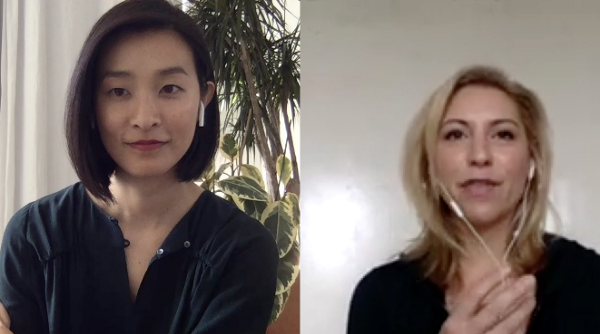
Desiree: Yeah. For me, it was a series of things that helped me fully, fully realize the separation. You know, bringing in a co-founder early on meant that I had to of course share the vision with someone else. But I think if I’m being honest with myself, it still always felt like mine and I was letting him in. Which is not a great way. We’re still good friends and we overcame I think the challenge in our partnership. But if I’m being really kind of just honest about how I treated things in the beginning, I think as you bring in senior team members, starts ruling some of your ownership over that control.
So in a way you kind of give up a little bit of that identification, tiny bits at a time. But truthfully for me, when I decided to step away as CEO and bring a new CEO. It’s not honestly something I would recommend to most people, it’s a very challenging way to do that, to separate yourself. A much healthier way is through coaching and through maybe therapy, reading, I don’t know, a combination of things.
I ended up working with an executive coach for a while who like helped me make a lot of progress and understand kind of my role within the vision, as opposed to being the creator of the vision.
So I don’t recommend getting a new CEO as a way to do it, I think there’re other ways. But sometimes it does take something daring like that to force yourself and then there is a grieving process, no matter how you do it. Because you are separating a piece of yourself and it’s not a divorce in any way, shape, or form, but it is retraining your brain to think about yourself and your value differently than you did before. It’s so liberating.
Honestly, this time around with Pearachute, I get to look at Pearachute as something that is on its own. I actually think truthfully being a mother has helped me do this that much more because I have two boys that I’ve birthed and then a step-daughter also.
My role as a parent is not to dictate who they become, right? But to help put them on this journey for success and to give them the foundation and the resources that they need to be their best selves. That’s true about a business too.
So you know, the analogy does continue, but one that is less emotionally aggressive I think, which is: If you treat your company as this being that has his own life, and its own identity, and its own brand – you create the resources and the support system around. It’s just such a much more relaxing place to live and you still want them to do well. You still need them to get into college, you still need all those things to happen but you’re not … It’s not the same as your own personal value.
Claire: Absolutely. What then are you doing differently with Pearachute in this approach? Is it a mindset, is it in conversations you’re having with your senior leadership team, has it affected your hiring? Like curious, given that you’ve learned, “Okay, I can’t be as emotionally aggressive.” what are you doing differently then with Pearachute to sort of set those boundaries?
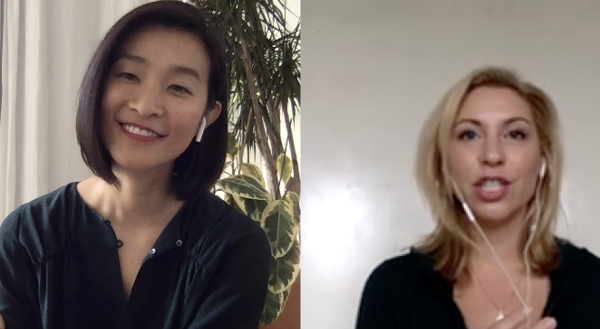
Desiree: Yeah, I’m doing so many things differently. Definitely hiring.
I hire a lot more for the individual athlete role.
I think if I’m being honest with myself, before, I hired good people that I thought would be good at the job, but this time I’m looking for efficiency, and a lot of creativity, and a strong level of autonomy. Because this time around I just have so much more trust and I sometimes feel sorry for some of my earlier team members because I just didn’t know how to trust them with the vision.
This time around I have that clear understanding. So people can achieve so much more obviously when you are willing to kind of give them that freedom to explore and make mistakes.
Of course, they fail and recover from those failures, and wow you, right? So creating room for that within my team is really important to me. Because of that, I often think we get more done with our eight or nine people than we did with our 40 that we had before. Just because people are able to be really, really focused.
I am so much better at clearing a path towards creating time blocks for people and making sure that they have enough time to do their work. Where in the past I think we really jammed meetings because there needed to be a lot of communication.
I think if you’re transparent and constantly doing a great job of reinforcing vision and the kind of ways you’d attack toward that end goal. That you don’t need to do as much real-time collaboration because people have a clear idea of where we’re all headed. It’s more about checking in with each other and confirming priorities, and then kind of getting back to work.
Claire: Absolutely. Yeah, and I mean, I think there’re so many CEOs and founders who I talk with who struggle with this, right? Like you start a company, you’ve been kind of killing yourself over it and now someone else is going to start to do your job. So being able to sort of release that and just be a lot more hands-off. It takes a certain amount of discipline but it sounds like that’s really paid off and been the difference for you, between the two companies. Yeah, that’s amazing.
Desiree: For sure and I’m actually very practical with my team too. A lot of their roles right now are a jack of all trades, wearing many hats.
So I remind that our job is to build this company to be big enough that you kind of earn the right to either hire your boss or hire the person to take everything off of your plate that you don’t love or aren’t the best at.
That really, like that is the sign that we have gotten there, is being able to also then relinquish some of the things. Sometimes it’s things that you do love that you have to relinquish. But I think if you’ve got into the culture, it creates less kind of territorial-ism and more of a willingness to like let peoples’ skills flow into the places that we need them the most. As opposed to like this is my silo, that’s your silo.
Claire: Absolutely.
Desiree: Which is something also that we did not as well in the first startup.
Claire: Totally. I mean, what you’re describing Desiree is the struggle that has come up so often in these conversations, which is a struggle with ego and a struggle with … again, like almost a sort of possessiveness. Which is very related to the very first thing you said, which was kind of the first answer you gave around what you felt like your biggest lesson was. Which is that it can be very easy to feel like when things are going really well, it’s all you, and then when things bad, it’s all you.
So tell me a little bit more about that founder mentality or … You know, I don’t know if you want to call it a syndrome, I don’t know if you want to call it sort of a blind spot, right? But why do we get stuck thinking that when things are really good, it’s all us, and things are really bad, it’s all us, and what are the dangers of that? Like how has that affected your journey as an entrepreneur?
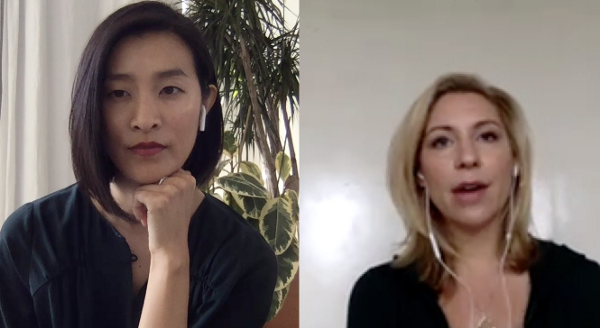
Desiree: Yeah. So a very specific example of this for GiveForward was … So we were a crowdfunding company, coming of age when Facebook was coming of age. We launched before Kickstarter but Kickstarter’s massive rise definitely helped elevate all of crowdfunding, right? So we falsely believed that because we were investing in SEO and paid search, and we had this great channel for distribution through Facebook, that the growth that we were seeing was entirely of our own doing. That we were figuring it out, we had the secret together.
Then it took the Facebook algorithm change to knock us down really big. We didn’t realized that we were growing on top of the growth of other giants, and that while we had been intentional in how we spent, we didn’t perfectly know how to find our customers. Our customers are very hard to find. The best friend of someone with cancer is a hard target, absolutely. But this time around, I have a better understanding of what kind of external factors can be contributing to growth.
At the same time, I’m more much laser focused on what are the measurable things that I can do within kind of our economics to create efficiency there. So that I can predictably know that when I put $50,000 into marketing, I’m going to get X numbers of customers out. So I think that comes with experience just in general and success. So now our user growth feels much more earned because I had that other thing to reflect on. But I’m also very aware that I am now sitting in a company that is targeting mostly millennial parents and only 20% of them have started having children. So there’s this massive group, that’s 80%, that is about to have children.
I will assume that our growth and rise to power will be because of what’s happening within these external forces. You know, paying attention to both I think helps to remember that like it’s not … Everything that you’re doing is not perfect and something that works now obviously might not work again in a year. But it’s when you’re in the middle of crazy growth, it’s hard not to pat yourself on the back and say, “Look how amazing we are. We’ve done all these things right.” The truth is, a lot of it is about timing.
Claire: Yes. I think that advice is worth its weight in gold. Because I don’t think you learn it until you get burned by that situation and you realize, “Huh, I think we made a lot of assumptions.” I guess, what advice do you have for founders and CEOs to be rigorous about not assuming that it’s all you? It sounds like from your perspective, the analytics, the level at detail that you’re looking at, like you were saying the metrics are really key. But is there something also you’ve embedded in your team, are there sort of systems you place in Pearachute? Curious just about advice you would give to other founders to do that well?
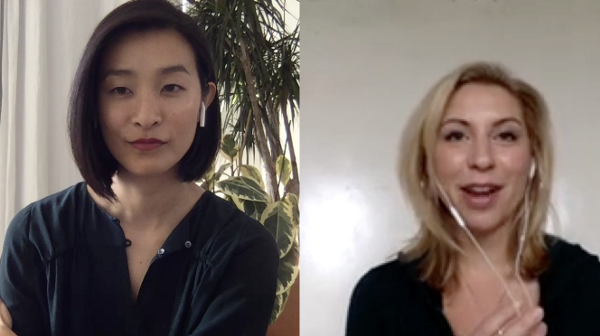
Desiree: Yeah. It’s so tempting, right? To find this path that works and double down. So yeah, that is an element, of course, with any level of growth. But for me, I am very aggressive with my team about diversifying acquisition. That paid search is great, or any kind of paid ads are great, until the cost of acquisition gets so high that you have a ceiling and you can no longer spend to affordably acquire your customers depending on your LTV.
So we have been conscious of the pieces of acquisition and since the very beginning knowing that, of course, there’s a viral component to the business, there’s also a direct, which is a little bit harder to manage or influence. We need to be working kind of equally on all parts, because at the end of the day, full reliance on one channel has very high risk of creating really expensive customer acquisition down the road.
Claire: Absolutely.
Desiree: So I would say just constantly diversifying, yeah.
Claire: Again, I think everyone who is watching this will be taking notes and writing that down. Desiree, thank you so much for sharing.
I’ve been learning a lot just listening to you. Like I said, you’re someone who I’ve always really, really enjoyed hearing about your experience in building and growing companies. So thank you so much. I know everyone who is watching has really appreciated your thoughts too. Thanks.
Desiree: Thank you for having me.
